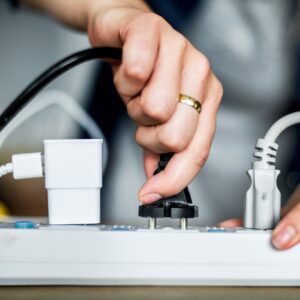During the Holidays & Throughout the Year
As temperatures cool and daylight dwindles, electricity usage tends to increase in households across the country. This is especially true for those who love to decorate their homes from Halloween through New Year’s.
Before pulling the inflatable lawn decorations and strings of tangled lights out of storage, we recommend pausing to think about electrical fire prevention.
The fact is, even if you live in a newer home, fire hazards still exist and should be closely monitored. The good news is that you can reduce the risks by following some simple safety measures.
Extension Cord Safety
Extension cords often come in handy, especially for holiday decorations and light displays. Just remember to follow these safety tips whenever you start to uncoil those cords.
- Never use a frayed or cracked extension cord
- Never overload extension cords with too many devices
- Don’t chain extension cords together
- Avoid plugging more than one appliance into a single extension cord
- Do not use an indoor extension cord outside
- Turn displays and other holiday lights off each night
Appliances and Electrical Safety
We depend on our appliances to run smoothly, particularly during the holidays. From basting the perfect turkey to baking your family’s favorite tasty treats, here are some ways to ensure your holiday meal prep goes off without a hitch:
- Always plug major appliances directly into wall outlets—never use extension cords
- If an appliance has a damaged cord, replace it
- Unplug smaller appliances when not in use
- Avoid using power strips with appliances
Preventing Electrical Circuit Overload
Overloaded electrical circuits cause a significant number of electrical fires each year. Overloaded circuit warning signs include:
- Blinking, flickering, or dimming lights
- Wall plates that are warm to the touch
- Frequently tripped circuit breakers
- Buzzing, sizzling, or cracking sounds coming from receptacles
- Burning smell coming from wall switches or receptacles
- Light shock or tingle when you touch appliances, receptacles, or switches
By following these tips, you can avoid electrical circuit overload and help prevent electrical fires. If you find that you need more outlets in your home, call a certified electrician to install them for you. Practicing electrical safety ensures that everyone has a merry—and bright—holiday season and beyond!
